Everyone should know some specific things if they ever slip and fall on water. The state of Florida and its courts have used some interesting ways to limit victims’ recoveries over the years.
While all personal injury claims need to meet certain requirements, premises liability cases are especially difficult in Florida. Slip and fall cases put a large burden on the claimant and their injury attorney to prove liability. The law has given property owners and their insurance companies a great deal of protections in the way Florida courts view slip and fall accidents.
Duty to Prevent a Slip and Fall on Water
Business owners owe their customers the highest duty the laws place on them. Their duty is to make sure the property is reasonably safe from hazards the owner knows or should know about. In practice for business owners, this means to maintain and clean their stores, while also warning customers of any dangerous conditions.
With slip and falls on water, this will typically be accomplished by regularly cleaning the store. Often, courts expect business owners or their employees to regularly inspect the premises for hazards. Additionally, when hazards are discovered, the law requires owners to warn of slippery floors.
Owners typically warn consumers by putting down wet floor signs. However, business owners (such as grocery stores) are not allowed to leave down wet floor signs at all times. Courts have been known to treat such a permanent warning as no warning at all.
An Owner’s Duty to Regularly Inspect and Clean
As stated above, business owners are expected to regularly inspect and clean their businesses. That is because when business owners do not clean up their properties, people get hurt. However, the major question is: how much inspection is enough?
This is a very fact-specific question. Certain businesses will be required to inspect their premises far more than others. Grocery stores with lots of foot traffic and liquids on the shelves will be expected to inspect more frequently. Meanwhile, businesses that don’t sell liquids or don’t see many patrons each day will inspect less frequently.
However, when someone does slip and fall on water, courts will always ask, was this a hazard the owner knew or should have known about? In other words, how can your injury lawyer prove they breached their duty of care?
Photographs and Testimony: A Slip and Fall on Water’s Best Friend
The mere existence of water on the floor is not enough to prove the owner of a store caused a slip and fall. Instead, we must show that the owner knew about the water or that they should have known about it.
In many instances it is hard to prove someone knew something. So slip and fall cases often come down to whether the owner should have known about the hazard. In order to prove that, an experienced personal injury attorney will need to know specifics about the water.
The best and simplest legal advice I give my clients in any situation is to take photographs. In a slip and fall, this means taking photographs of the thing you slipped on. It also means taking pictures of the area surrounding the fall. Photos of the area and a description of the liquid a victim fell in are invaluable.
For instance, if the liquid was dirty, that indicates that a puddle was there for a long time. Additionally, if there were footprints in the puddle that would also indicate the water had been there long enough that a court would expect it to be cleaned prior to the fall.
Common Injuries of Slip and Falls on Water
Many slip and fall accidents result in a hard impact on wrists. That is because when people fall they will typically use their hands to catch themselves. Additionally, many slip and fall victims (especially elderly ones) will injure their hips. This usually happens as a result of the victim landing on their side.
Also, because of the hard surfaces involved and the crowded nature of many slip and falls, many slip and falls result in head trauma. While falling, slip and fall victims will often hit their head on the ground, a wall, or another nearby object. The injuries that can be caused by this sort of head trauma are known as traumatic brain injuries (or “TBI”) and they can be very serious.
Many slip and falls will result in injuries to the victim’s neck and back. That’s because of the forces exerted on a person’s spine during a slip and fall. The forces can caused damage to the victim’s spinal cord, herniations of the spinal discs, or even fractures of the vertebrae.
Call Knapp Accident & Injury Law
We have the experience and aggressiveness to help pursue your slip and fall case. Call us today for a free consultation. Any legal advice we provide will be completely confidential under our attorney-client relationship.





